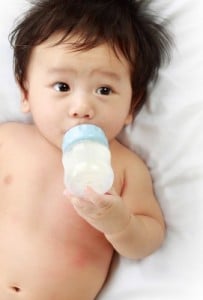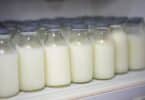
Sociology professors Ben Gibbs and Renata Forste found that clinical obesity at just two years of age can be traced back to infant feeding habits. And indeed, their data was consistent with former research – formula fed babies are 2.5 times more likely to become obese as toddlers than babies who were breastfed during the first six months of life.
“The health community is looking to the origins of the obesity epidemic, and more and more, scholars are looking toward early childhood,” Gibbs, lead author on the study, told Science Daily. “I don’t think this is some nascent, unimportant time period. It’s very critical.”
But interestingly enough, the researchers say this isn’t just about breast versus bottle.
“There seems to be this cluster of infant feeding patterns that promote childhood obesity,” Gibbs said.
Published in Pediatric Obesity, the study found that babies who are put to bed with a bottle have a 36 percent higher risk of being obese. And babies who are given solids too soon (prior to 4 months of age) increases a child’s risk by a whopping 40 percent.
“Developing this pattern of needing to eat before you go to sleep, those kinds of things discourage children from monitoring their own eating patterns so they can self-regulate,” Forste told Science Daily.
Forste said that it all goes back to the nature of breastfeeding. When a baby is fed at the breast, the mother really has no way of knowing how much the baby has consumed. Instead, babies learn to recognize when they are full and use cues, like pulling away from the breast, to indicate that they are done. Breastfeeding mothers use these cues to determine when their babies are finished eating.
This kind of skill isn’t developed in formula fed babies, Forste says. In fact, many formula feeding parents push their baby to finish their bottles, when, in fact, the baby may be full. But Forste says that, by taking baby’s cues in bottle feeding as they would in breastfeeding, parents may be able to cut their baby’s obesity risk later on in life.
“You can still do things even if you are bottle feeding to help your child learn to regulate their eating practices and develop healthy patterns,” Forste said. “When a child is full and pushes away, stop! Don’t encourage them to finish the whole bottle.”
Sally Findley, a public health professor at Columbia University, says that this new study clearly suggests that feeding practices during infancy can impact a child throughout their lives. And, because breastfeeding rates are lowest in poor and less educated families, she says that this could explain at least part of the reason why obesity rates hit so hard below the poverty line.
“Bottle feeding somehow changes the feeding dynamic, and those who bottle feed, alone or mixed with some breastfeeding, are more likely to add cereal or sweeteners to their infant’s bottle at an early age, even before feeding cereal with a spoon,” Findley told Science Daily.
Gibbs and Forste, who has already published previously on why women stop breastfeeding, plan to expand on their research by reevaluating the link between breastfeeding and cognitive development during childhood.
Related Articles:
- Researchers Say Co-Sleeping Increases SIDS Risk by Five-Fold
- Only 25% of All Sunscreens Provide Long-Lasting, Quality Protection
- Study: Breastfeeding may Decrease ADHD Risks






